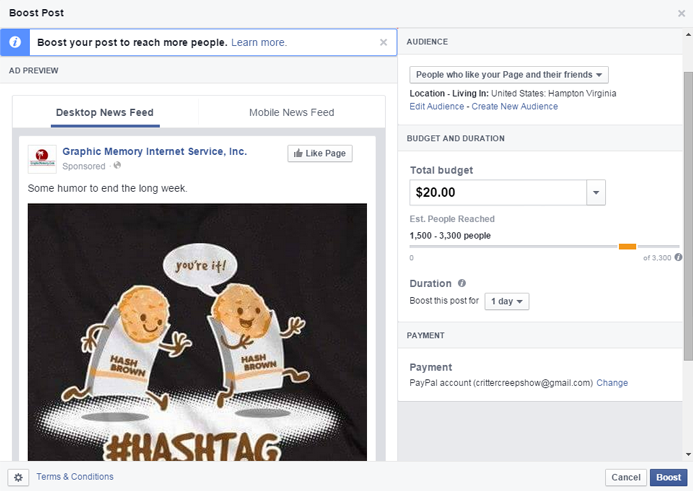
Is the Free Ride Over?
As many of us predicted for quite a long time, and then knew for quite a long time, organic (unpaid) reach on Facebook business pages is dwindling away. This leads many business owners to a great deal of frustration. Many are feeling that what used to be the best free source for spreading brand awareness has more or less become another paid advertising platform.
That's not all it is though! There are still many tremendous benefits to having a great business page, keeping it up, and investing in its growth. For those out there who do not already have a giant audience, this will most likely mean spending a little more time and money.
There are two main ways of reaching a larger audience on Facebook. You can implement ads on the site, or you can promote posts. This may leave you asking, "Which is right for my business?"
Let's Start With the Good Ol' Facebook Ads
Facebook allows you to pay to place ads which are displayed to an audience you choose through targeting. They offer demographics like age, gender, location, and even specific interests. Once you've chosen your target audience, Facebook will give you an estimate of people that your ad could potentially reach. Don't be mistaken, though...This is not the number of clicks you'll get. That depends largely on the budget that you set, and the quality and content of your ad itself. After all, a million people could see your ad but if it's not enticing, there's no guarantee that a single person will click it.
With an enormous pool of users to target, and a cost-per-click that is drastically lower than many other Pay-Per-Click ad venues like Google Adwords, Facebook ads can be a great tool for content marketing and expanding your reach.
On to Promoted Posts
If the first question you find yourself asking is, "Why would I pay to show people a post when people will already see it?" then you've got a little catching up to do! Before fall of 2012, when you made a post on your page, it would be served up to all of the people who liked your page. Unfortunately since then, there has been cut after cut after cut to the numbers of likers that actually see your posts in their newsfeeds. Facebook has confirmed that ultimately (at some undisclosed time), page posts will receive no organic views. This means whenever you post on your page, the only people who will see it are people who specifically find and click on your page, and then look at your page's timeline. That is, unless you promote posts.
This is done by making a post as usual, and then clicking the "boost" button after you've posted it. You'll then have options to set a budget. You can also decide if you want your post to be served up to people who already like the page, or if you'd like to target a new audience. Once your post has been boosted, Facebook will put your post into the newsfeeds of the audience you select. Your budget will be the biggest factor in determining how many people are reached.
Both methods have advantages and disadvantages, much like any other form of paid marketing. The simple fact remains, however, that social media is quickly becoming a pay-to-play world for the businesses that have enjoyed free reach for so long.


